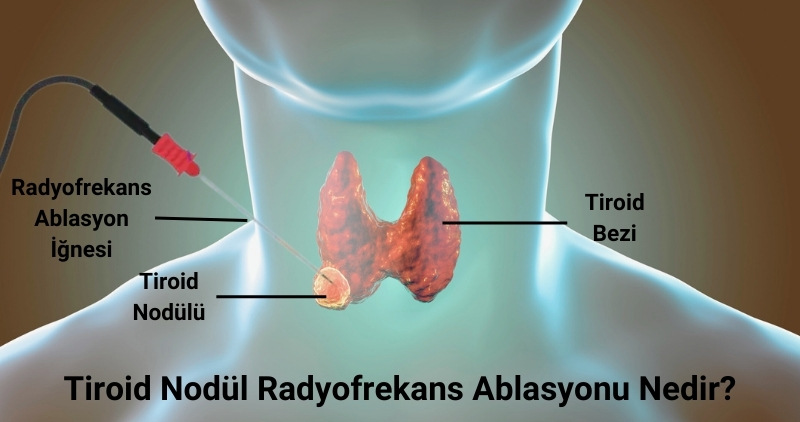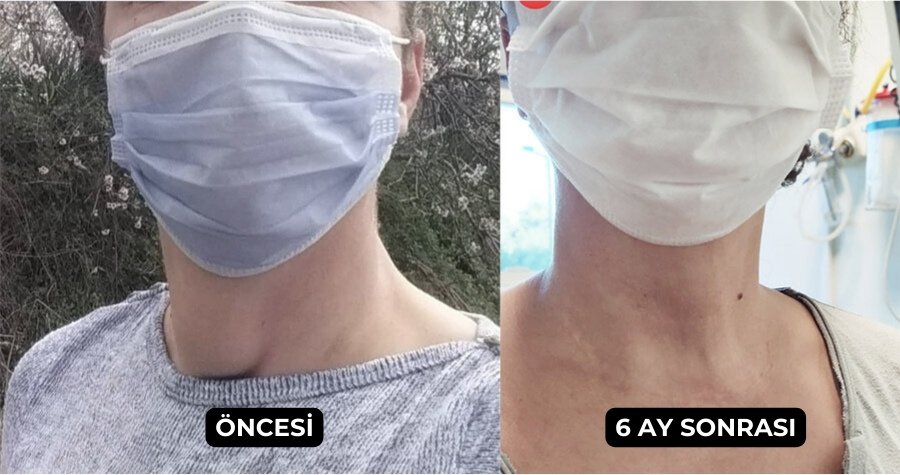What is Thyroid Nodule Radiofrequency Ablation (RFA)?
Thyroid nodule radiofrequency ablation is a procedure that reduces the size of the thyroid nodule through heat generated by the excitation of tissue ions around the radiofrequency electrode and the friction it causes. Radiofrequency ablation destroys live cells within a few millimeters of the electrode, causing irreversible damage to the cells of the thyroid nodule at temperatures between 60 and 100°C. Tissue coagulation occurs almost instantly, leading to irreversible damage in the thyroid nodule cells.
Radiofrequency ablation can effectively shrink and treat nodules in the thyroid gland as part of thyroid cancer treatment. You can contact the Interventional Radiology Specialist Associate Prof. Dr. Bülent Çekiç Clinic, which operates in Antalya Muratpaşa and also in cities like İstanbul and Ankara, to receive thyroid nodule radiofrequency ablation treatment.

Radiofrequency ablation has been used for nearly 30 years in liver, lung, and kidney tumors, while thyroid nodule radiofrequency ablation has been used for almost 20 years in the treatment of thyroid nodules.
How is thyroid nodule radiofrequency ablation performed?
During thyroid nodule radiofrequency ablation, the skin in the neck area is first disinfected, and the skin and thyroid capsule around the nodule are numbed with local anesthesia. A thin antenna is then inserted into the thyroid nodule, and the entire nodule is destroyed by heat. If the thyroid nodule is adjacent to the vocal cord or carotid artery, serum fluid is injected between the nodule and the vocal cord/carotid artery to create a safe thermal barrier. This method is called Hydrodissection. After the ablation procedure, follow-up thyroid ultrasonography checks of the treated nodule are performed at 1, 3, 6, and 12 months. Generally, a 80-90% reduction in the thyroid nodule is expected by the end of the 6th month. If the nodule is an active hot nodule that secretes hormones, additional thyroid hormone tests are performed 3 weeks after the procedure.
What are the advantages of thyroid nodule radiofrequency ablation?
- The procedure is performed under local anesthesia, and there is no need for general anesthesia.
- No scar remains on the neck.
- The procedure lasts between 5-20 minutes, so the patient can immediately return to daily life.
- The patient does not lose the thyroid gland and will not need lifelong external thyroid hormone support.
What are the advantages of thyroid nodule radiofrequency ablation over microwave ablation?
- Microwave ablation antennas are thicker than radiofrequency antennas.
- Radiofrequency ablation works based on tissue impedance (resistance), so during ablation, carbonization (charring) in the nodule is less, leading to a 5-10% greater reduction in the nodule size post-ablation.
Alternatively, you can also explore cryoablation as a thyroid cancer treatment method.

How long does thyroid nodule radiofrequency ablation take?
The duration of the thyroid nodule radiofrequency ablation procedure varies depending on the size of the nodule, but it generally takes between 5-20 minutes.
Is hospitalization required after thyroid nodule radiofrequency ablation?
There is no need for hospitalization after thyroid nodule radiofrequency ablation. The patient can be discharged one hour after the procedure and return to normal daily activities.
Thyroid Nodule Radiofrequency Ablation Prices
The prices for thyroid nodule radiofrequency ablation can be provided after a preliminary examination by Interventional Radiology Specialist Assoc. Prof. Dr. Bülent Çekiç at his clinic in Antalya Muratpaşa, as well as in cities like İstanbul and Ankara. It is important to determine whether the patient is suitable for radiofrequency ablation treatment. After necessary tests like thyroid biopsy and other investigations, the exact treatment price can be given. For more detailed information and appointments, please contact us.

 TR
TR

